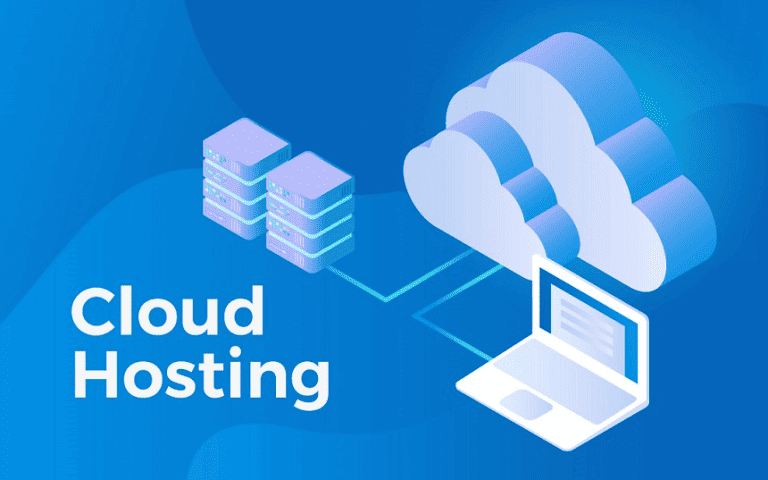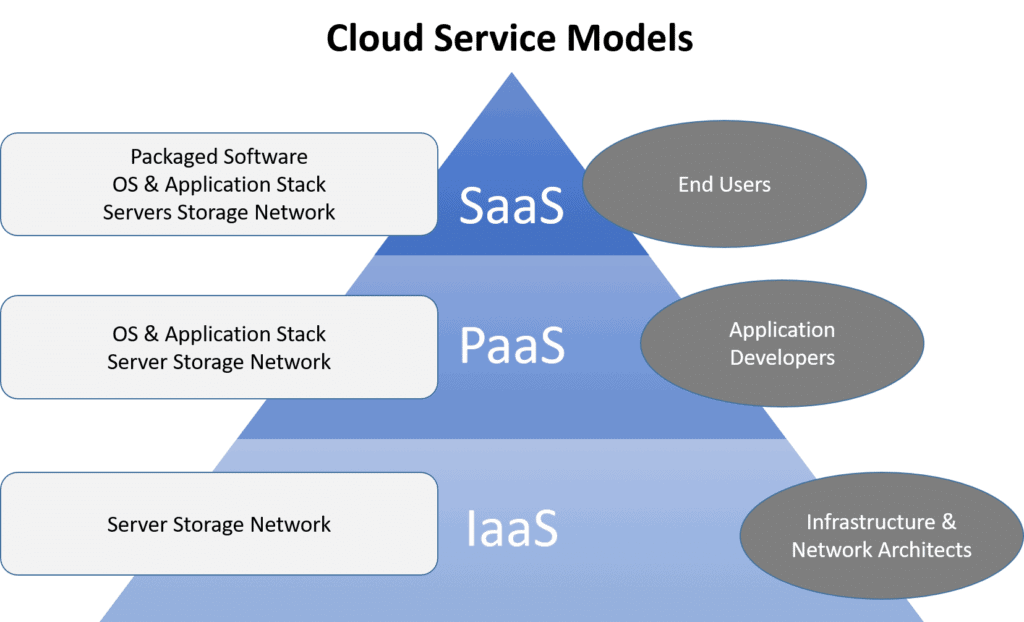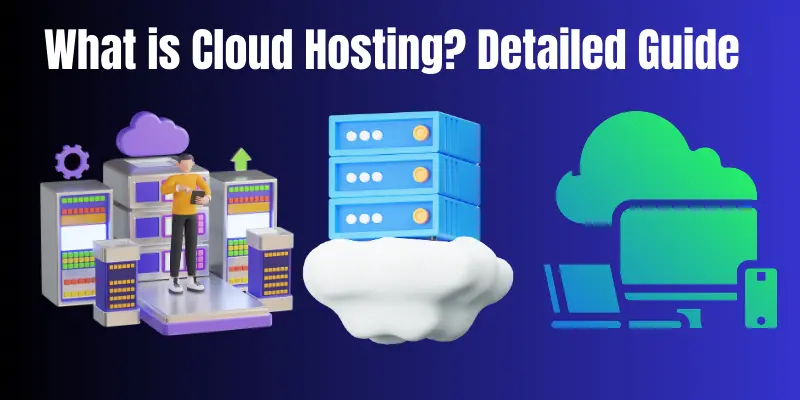What to know what is cloud Hosting? Is cloud hosting the best choice for your business site?
There are many questions in your mind when you are searching for the best cloud Hosting.
Today in this article, I will be covering the all points about what is cloud hosting. What all you need to know to decide on your hosting?
So let’s get started with it without any delay.
What is Cloud Hosting?

Cloud hosting refers to hosting websites, applications, databases, or storage on remote servers accessed over the internet. All the cloud hosting servers are owned and maintained by a service provider and the provider is made available to customers on-demand through self-service portals.
In this beginner’s guide, we’ll cover:
- Types of cloud hosting services
- Benefits and disadvantages of cloud hosting
- Differences between cloud hosting and traditional hosting
- Factors to consider when choosing a cloud host
Types of Cloud Hosting

There are three main types of cloud hosting services:
1. Infrastructure as a Service (IaaS)
With IaaS, you rent IT infrastructure like servers, storage, and networking on demand from a cloud provider. Instead of purchasing hardware, you access it as a fully outsourced service.
Some examples of IaaS providers include Amazon Web Services (AWS), Microsoft Azure, and Google Compute Engine.
Benefits of IaaS:
- Cost efficient – No upfront investment in hardware.
- Scalable – Scale services according to demand.
- Flexible – Access services on-demand. Pay only for what you use.
Use cases:
- Creating virtual machines
- Storing data
- Hosting websites and applications
- Backup and recovery
2. Platform as a Service (PaaS)
PaaS provides a managed platform with pre-configured servers, storage, and networking for you to deploy applications quickly without managing any infrastructure.
Some PaaS providers are Heroku, AWS Elastic Beanstalk, and Microsoft Azure App Service.
Benefits include:
- Increased productivity – Faster application development and deployment.
- Cost savings – No infrastructure costs to worry about.
Use cases:
- Building and hosting web apps
- Mobile and IoT development
- Streaming services
3. Software as a Service (SaaS)
SaaS allows you to use applications hosted in the cloud through your web browser without installing anything. Cloud providers manage everything from data to application availability.
Examples are email and office tools like Google Workspace and Dropbox for storage.
Benefits include:
- Accessibility – Use software anywhere through the internet.
- Low cost – No large upfront costs for licenses. Pay per user fees.
- Automatic updates – No need to manually update software.
- What is Affiliate Marketing
- Why Network Marketing is Better Than a Job
- Why Affiliate Marketing is a Great Option as a Career
Some use cases are:
- Office tools
- Accounting
- File storage and backup
Benefits of Cloud Hosting
Here are some of the main benefits of using cloud hosting services:
1. Cost Efficiency
Only pay for the resources used without large upfront costs for servers and infrastructure. Saves money, especially for new websites with unpredictable growth.
2. Scalability and Flexibility
Scale website traffic up and down easily through the cloud panel without any downtime. You don’t need to worry about limited bandwidth or storage issues.
3. High Availability
Cloud platforms provide significantly higher uptime because of infrastructure redundancies across multiple geographic regions.
4. Managed Services
Cloud providers handle tasks like software updates, security patches, backups, etc. There is no need to hire dedicated IT staff.
5. Business Continuity
Easy disaster recovery through backups makes the cloud ideal for business continuity when outages happen.
6. Productivity
Faster deployment of resources through the cloud saves a lot of time compared to buying and configuring physical servers.
7. Global Presence
Deploy to data centers around the world easily for lower latency. Great for global-facing websites and applications.
Disadvantages of Cloud Hosting
1. Dependency on Internet Connection
Applications and data hosted in the cloud rely on a fast, low-latency internet connection at all times. Slow or unstable connections will result in performance issues.
2. Technical Expertise Required
Migrating legacy applications or databases to a cloud platform requires some technical expertise related to things like automation, networking or security management.
3. Security Concerns
Storing data and important files on third-party servers not fully under your control has some inherent security risks including vulnerabilities and attacks. Proper encryption and backups are a must.
4. Vendor Lock-in
Once committed to a single cloud provider, it can be difficult to migrate data and apps to another platform in the future. Need to factor this into the initial provider decision.
5. Cost Predictability
Unexpected spikes in traffic can result in unexpectedly high bills at the end of the month for pay-as-you-go services. Budgeting and monitoring usage is important.
Cloud Hosting vs Traditional Hosting

Here is a quick comparison between traditional web hosting and cloud hosting:
| Aspect | Traditional Hosting | Cloud Hosting |
| Hardware | Physical servers leased or purchased | Uses virtualized, software-defined hardware |
| Scalability | Limited bandwidth & storage capacity | Auto-scale seamlessly to accommodate spikes |
| Uptime | Prone to more outages | Spread across global network of data centers |
| Performance | Inconsistent due to aging hardware | Consistently fast on modern infrastructure |
| Support | Provided by company technicians | Access to community forums or developer docs |
| Updates | Requires manual OS and server updates | All backend infrastructure maintained by provider |
| Security | Your responsibility completely | Cloud provider handles security patching |
| Cost | Fixed monthly costs | Pay per actual usage, more flexibility |
| Speed | Slower provisioning of new servers | Spin up new resources almost instantly |
While traditional hosting works well for smaller websites with predictable resource needs, cloud hosting provides better scalability, speed, and resiliency for modern web applications.
Choosing a Cloud Hosting Provider
Here are some important considerations when selecting a cloud hosting platform:
Supported Integrations and APIs
What third-party tools and software can easily integrate with the platform? How extensive are their API options?
Reliability and Uptime History
Check for a consistent history of high uptime across their data centers. Verify with online monitoring tools.
Security Practices
Review their security white papers. Ensure encryption, data privacy measures, and frequent patching audits.
Read Performance Benchmarks
Compare independent platform benchmarks relevant to your tech stack for speed and metrics.
Global Infrastructure
For users worldwide, distributed geo-redundant data centers improve latency and redundancy.
Support Options
Live chat, phone support and online documentation quality differs greatly between providers.
Pricing Model
Compare monthly calculators pricing for your expected workloads. Includes free tier? Pay-as-you-go or fixed configs?
Ease of Migration In and Out
How easy is it to setup and migrate your apps and data onto or away from the platform in the future?
Getting Started Guides by Provider
Most cloud platforms offer free trials or introductory tiers for new customers. Here are some getting-started guides for each provider to help you deploy your first app:
- AWS Getting Started
- Google Cloud Getting Started
- Azure Getting Started
- Heroku Getting Started
- DigitalOcean Getting Started
Conclusion
We hope this beginner’s introduction has helped answer the question – what is cloud hosting? We covered the major types of cloud services (IaaS, PaaS, and SaaS), benefits like scalability and managed infrastructure as well as downsides like security concerns.
We also compared cloud hosting characteristics to traditional hosted environments and what factors to consider when picking a cloud platform.
Cloud adoption continues to grow rapidly as modern apps need flexibility, speed, and resilience. For new websites and web apps today, cloud hosting often provides the best value and makes it easy to scale up seamlessly as your traffic grows without maintenance headaches. Each cloud hosting provider has free trials and guided documentation to get you started today.
